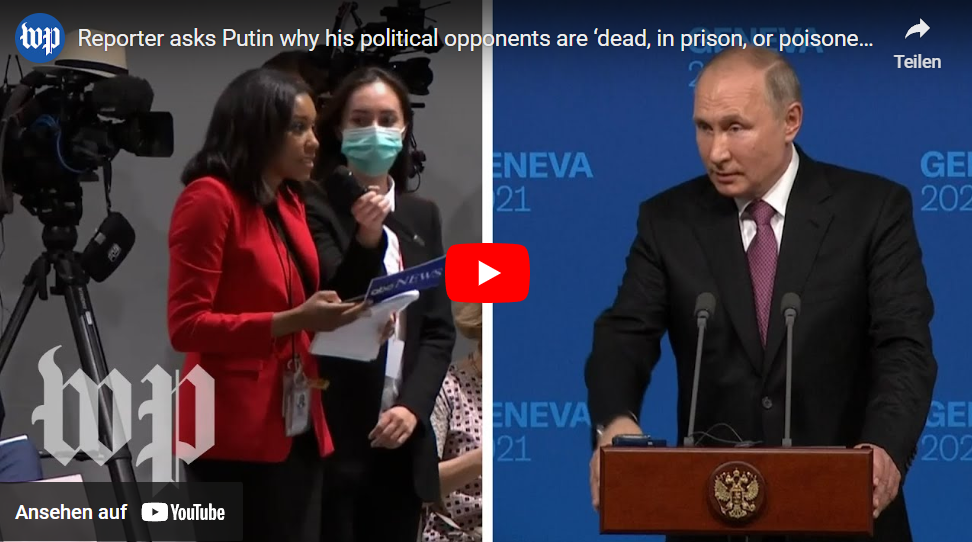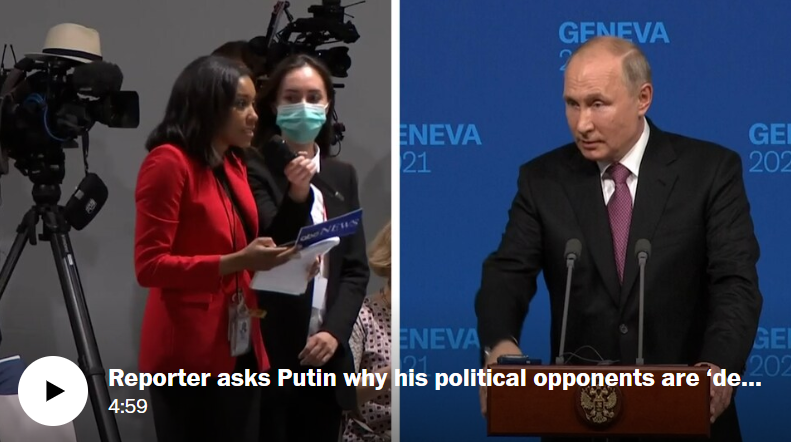
On June 16th 2021 Journalist Rachel Scott asked Vladimir Putin1:
“If all of your political opponents are dead, in prison, poisoned, doesn’t that send a message that you do not want a fair political fight?” (quote at 3:24 in the recording)

Simplified to this core jackal:
“It’s wrong/unfair to use physical violence against political opponents.”
Vladimir Putin replied in some detail why he sees the use force not only allowed, but even necessary and beneficial to a nation-state or country.

I hear his core jackal message like this:
“Please be honest. In the USA you treat political opponents more violently than we do (shot an unarmed woman in the peaceful Jan 6 2021 demonstrations at the Capitol in Washington) and nation-states by all means should make protective use of force to stop crowds from causing progroms and chaos (Black Lives Matter movement) or enemy organizations intended on splitting society (Anti-Corruption-Fond mobilizing under-age children and teaching the use of Molotov cocktails).”

This dialogue excerpt shows an example of our habitual way of communicating.
Neither side is hearing the other in their true meaning.
Deeper understanding is possible
Vladimir does not hear the true meaning of Rachel’s words.
He wears Jackal ears, hearing her attacking him for wrong-doing and being very dishonest at the same time, because he sees the USA being much more violent than the Russian state.
Rachel does not hear the true meaning of Vladimir’s words.
She wears Jackal ears, hearing him as dogding the bullet, “answering without answering – as politicians always do” – which she expresses as: “You didn’t answer my question.” after the first portion of the reply at 3:20 minutes in the recording.

With other words – deeper understanding of the words of a person would be better, especially if practiced by both partners in a dialogue, before adding our own concerns and requests. But if one party can do it, it will already change everything. The one-sided practice of this requires that one person does double work of deeper understanding – for themselves and for the dialogue partner. This is a rare skill.
 |  |

| I am right and you are wrong. | Excuse me – no. I am right and you are wrong. |
Deeper understanding
How could deeper understanding manifest, if both people would be able and willing to practice it?
So Vladimir might check his accurate hearing of Rachel’s deeper meaning like so:
“Do you refer to cases such as secret service agent Litvinenko, politician Navalny or journalist Politovskaja and would you like people to be able to live safely and freely at the same time?”
Rachel might say “Yes.” Or give more information on what was not being received as she meant it. Vladimir would keep checking until there would be a sense of her question being fully understood.
Similarily Rachel might check her hearing of his reply with deeper understanding like so:
“Are you saying that nation-states have to use force in order to protect society from harm and chaos?“
Maybe the answer would be “no” – what matters is the intention to truly understand the other side and to keep checking, until the goal is accomplished.
Intention, Capacity, Trust, Practice
The key here is the intention behind the question. Do we actually want to understand the deeper meaning? We could want to hear someone, but are we also able to hear another? Do we have inner space for curiosity and care?
And often there is no such space.
Especially when the topic we can have differences about is a very important one.

This is the reason why anyone who is in touch with momentous decisions and/or deep suffering needs to build inner stability and compassionate space outside of the situation, in order not to be carried away by intense emotions and jackal habitual mechanics of dialogue – hearing ourselves in what the other person says.
While I do not see this being practiced in socities, I do see a lot of practice of jackal strategies.
On all levels of dialogue misunderstanding and pushing one side over another without understanding and care are present. Inside of us and outside of us.

This state of affairs maybe seen as not so perfect; yet it also offers us a lot of examples to practice the transformation from what is being heard to what is being meant. We do this by bringing the ears of deeper understanding to each example – one at the time. There is no hurry in this – the only time is now.
The beauty of taking on such transformation or translation offers is that every single one can lead to a sense of liberation, feeling like an exquisite sort of paradise.
This is why – among other things – the kingdom of God is availabe in every moment.
It is up to us to stop – and reach in to reach out.

Trust is often at the core of any meaningful move towards better relationships. We can do the work of transformation inside of us to create space for true encounter with another person. To really see them. Without space to receive another in their true meaning, the other may not have space to receive our meaning.
It is nice to see that possibility that we have to make a difference in all of our relationship and in the world at large.

